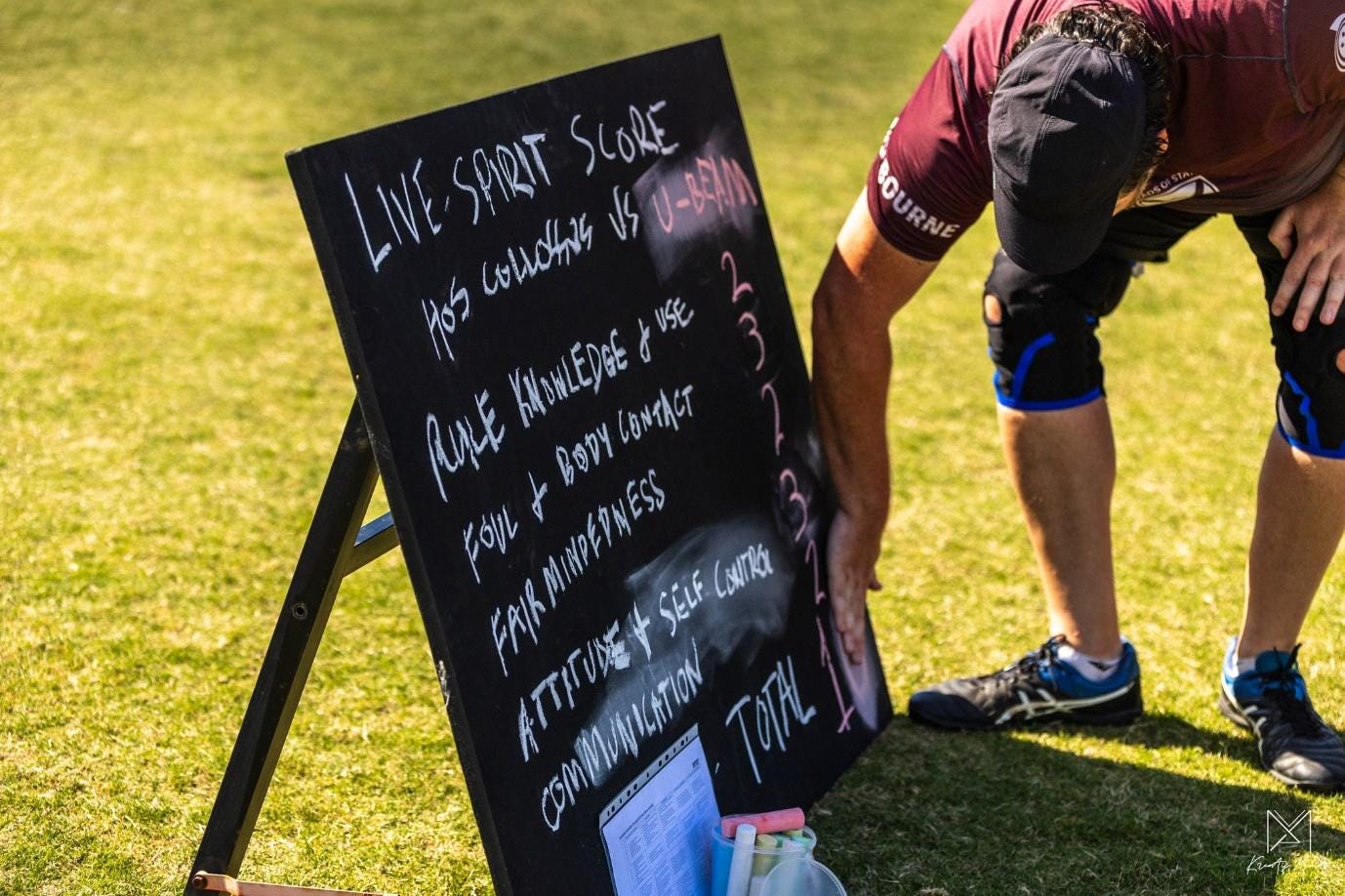The Live Spirit Scoreboard
Valuable tool or too spicy? Tell us your thoughts in the comments!
It’s us. Hi. We’re the problem, it’s us.
Many of you who were at AUC Division II may have seen this piece of apparatus getting about. Usually on Field 8. Those of you not there may have seen the IOU Facebook page post a photo of it in their story.
Before I start telling you about it, allow me to state up front – it is not a piss take. It is genuine, and treated very seriously by our team.
The Live Spirit Scoreboard
Melbourne Colossus is Heads of State’s third open team. For a time in the 2010s it was the entry point into the club out of local leagues, unis and high schools. Quite a number of current and past Juggernaut and Carnage players first pulled on the burgundy and white playing for this team. This year it was revived because there was demand for it. We assembled some good leaders and had clear objectives – to set the young players up for future success.
But the unspoken objective that sat above the written down ones was always there – this is a Heads of State team, so along with that comes a certain brand of energy. “Certain” can mean whatever you want it to mean, we don’t mind. We can create cult level buy-in from players if we do it well, but understand we can also become toxic with it if we aren’t careful. So how do we hold ourselves accountable?
By making a very big target (say, the size of half a ping-pong table retrieved from hard rubbish) and placing it on our backs.
The Live Spirit Scoreboard was first done by Juggernaut at AUC Division I in 2022. They viewed it as a real-time, explicit method of giving feedback to teams, albeit in a cheeky manner. We adopted it for 2024, for three reasons.
Remove the passive-aggression from spirit scoring
How many times have you played a game where there was no feedback on spirit offered other than “yeah nah everything’s good”, and then later when you check the results you were given a 9? Or when they talk up how good you were in the spirit circle, and give you the standard 2s across the board? Part of what comes with self-refereeing is communication with the other team, whether it be via calls and responses to calls, or direct conversations. There’s no need to be afraid of it, it’s not a confrontation, we all understand what’s being done here. By having something visible where we knew the whole opposing team could see it, we could let them know as we went, not just at half time and at the end. When we changed a number, we told them why. There was absolutely no room left for ambiguity* or post-loss bitterness.
It’s not “our” spirit versus “their” spirit, it’s just “the” spirit
I’m trying very hard not to make this yet another diatribe on spirit, so bear with me here. We had a view on our team that the Spirit Of The Game was an intangible third entity that sat in between the two teams. That both teams contributed to a shared attitude, rather than just having our own that stood independent of theirs. This framed the way we talked about score changes and reflected on our own conduct – “hey they’ve been really good at contact avoidance, we need to follow along”, or “both teams are stuffing around on the line, let’s set the example and hurry it up.” All of our players had read the WFDF Example Behaviours sheet (plus, as seen in the photo, we also kept a copy at the scoreboard) so they were in tune with what’s expected, rather than just copying whatever their senior players did. We tried to keep it dry and remove the emotion from it.
Hold ourselves to a high standard in our conduct
There’s no more effective and immediately way to draw attention to your own behavior than to loudly point at someone else’s. We acknowledged as a team beforehand, and to opposition captains at the flip, that having this scoreboard meant that we needed to expect other teams to be a lot more stringent on their expectations of us. And so, we did the work. Not only did we do the rules accreditations, we discussed and tested various scenarios at training. We worked on defensive techniques that minimised risk of contact. We held each other accountable on our reactions to calls.
Were we perfect? Of course not. Far from it. We were a young and inexperienced team who got over-the-top excited a lot so there were spikes, outbursts and too much carry-on after goals. In fact, see for yourselves what other teams thought:
The main thing is that we checked ourselves, we remembered to uphold the enjoyment of the game over everything else, and we had an awful lot of fun doing it.
There’s no real lesson we’re trying to preach here, I’m just telling a story. You could maybe do one of those three things in your own way. Or not. We don’t mind. We’re going to keep doing stuff like this at our club because it works for us. And we’re also going to spend the off-season wondering what the fuck we’re going to have to do next year to earn a 4 for Communication.
* There was one game where the spirit score we gave didn’t match the score on the board. This is because we got caught up in being a close-ish game and neglected to update it during the last 20 or so minutes. The other team, justifiably and respectfully, challenged us on it later and we apologised for the difference.
By Simon Talbot





